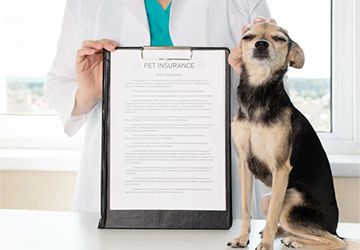Insurance
You want the best for your four-legged friend, including their health and happiness. When it comes to insurance, most people are torn between accident-only and comprehensive insurance.
But what is the difference between the two? Which one do you choose for yourself and, more importantly, your pet?
In this blog post, we look at the six key differences between these two types of pet insurance so that you can make an informed decision based on your pet's needs and budget.
So, let's dive into the best world of pet insurance for your furry friend.

Comparing Accident-Only vs Comprehensive Pet Insurance: 6 Key Differences
Here are the six key differences. By understanding these differences in more detail, you can decide which insurance plan is best for your pet and your wallet.
1. Accident-Only vs Comprehensive Insurance
Some of the critical differences between accident-only and comprehensive pet insurance have to do with coverage.
By definition, accident insurance only covers injuries and medical expenses resulting from an accident. This includes broken bones, cuts, burns, or other physical trauma. This type of insurance is necessary to protect your pet from any accidents.
It does not cover any illnesses or preventative measures. On the other hand, comprehensive policies offer a wider range of protection. In addition to accidents, comprehensive policies also cover diseases and preventive measures.
This means that if your pet develops a severe illness, such as cancer, diabetes, or an immune system disorder, your comprehensive policy will cover surgery, medications, and diagnostic tests.
In addition, many comprehensive policies cover routine care, including annual checkups, vaccinations, and dental cleanings, to keep your pet healthy and happy.
2. Comparing Costs and Premiums
Another significant difference between the two types of pet insurance is the cost and premiums of each policy. Accident-only pet insurance has lower monthly premiums than comprehensive plans.
This is based on the level of coverage provided by this policy; it does not cover issues like illness or maintenance care.
Comprehensive policies typically come with significantly higher monthly premiums due to the increased coverage. Protecting against a wide range of health issues, accidents, illnesses, and routine care creates a comprehensive safety net for your pet's health.
The premiums for comprehensive policies may be prohibitive at first. However, you need to consider the financial benefits in the long run, mainly if your pet develops a severe illness that requires expensive medications.
3. What medical expenses are covered?
Understanding the covered expenses will help you compare accident-only and comprehensive pet insurance. Such insurance plans typically cover costs related to injuries sustained in an accident.
This coverage includes emergency veterinary care, surgery, diagnostic tests, and medications to treat injuries. However, these plans do not provide sickness protection or preventive care.
They cover a more comprehensive range of costs. In addition to accident-only insurance covering accident-related expenses, comprehensive insurance covers sickness and preventive expenses.
These may include expenses for:
● Diagnostic tests and imaging
● Surgery and hospital stay
● Prescription and over-the-counter medications
● Chemotherapy and radiation therapy
● Routine checkups and vaccinations
● Dental cleanings and treatments
Comprehensive pet insurance covers a broader range of medical expenses, providing a giant safety net for your pet's health.
4. The role of prevention
It is vital to your pet's overall health and quality of life. The difference between accident-only and comprehensive pet insurance policies lies primarily in the reimbursement for preventive care.
Services such as routine checkups, vaccinations, and dental cleanings are not covered by the insurance, which is only for accidents. Anyone who purchases an accident-only policy must provide these necessary benefits out of pocket.
In other words, preventive care is already covered by most comprehensive pet insurance policies. Scheduling routine checkups, vaccinations, and dental cleanings will help identify potential health issues with your pet early and take advantage of the savings.
Comprehensive insurance with preventive coverage keeps costs in check through preventive measures, allowing you to live an affordable, happy, and healthy life with your pet.

5. Differences in Damage Limits and Benefits
Damage limits and benefits differ between accident-only and fully comprehensive pet insurance policies. Generally, accident-only policies have lower damage limits than fully comprehensive policies.
The amount of compensation a person may receive for a single incident or injury may be capped. Additionally, treatment or surgery is often excluded, which limits the total payout a person can receive.
Comprehensive pet insurance policies have higher claim limits and more extensive coverage.
For example, a higher payout may be available if a pet requires expensive medical treatment, particularly surgery or an extended hospital stay.
Comprehensive insurance policies are less likely to exclude certain medical conditions, providing a better safety net for your pet's overall health.
This should mean it pays to carefully examine the limits and structure of any policy you are considering.
Be aware of annual and lifetime caps, and check for exclusions and limitations that apply to certain medical conditions or treatment claims.
6. Who should choose which insurance?
Consider your pet's needs and financial situation when choosing between accident-only and comprehensive pet insurance.
Most pet owners are more concerned that their pets could get hurt at any time. Therefore, this type of pet insurance is worth considering because it is usually the cheapest.
Suppose your pet is young and healthy and has no pre-existing medical history or breed predispositions that could cause it to become ill. In that case, an accident-only plan may be more feasible in terms of monthly costs.
Let's say you want to consider more comprehensive insurance that covers many health issues, including illnesses, accidents, and preventive care. Comprehensive pet insurance is unmatched in this case.
In particular, a comprehensive plan should be in place if a pet owner:
● Owns an older pet or a breed that may be susceptible to genetic diseases
● No worries knowing your pet is insured for a variety of situations
● They are okay with paying a higher monthly premium for comprehensive and healthy coverage
● We highly value preventive measures to ensure your pet remains healthy and happy
The final decision between accident-only and comprehensive pet insurance should only be made after considering personal needs and priorities.
Make an informed decision now!
This is where the two types of pet insurance, accidental and comprehensive, go entirely off-topic. Now that we've highlighted the key differences between the two policies, it's time to take action and seek the most suitable coverage for your pet.
It's time to assess your furry friend's specific health needs, determine your financial health, and determine which insurance will provide you with the best protection.
Before suffering a sudden accident or illness, make sure you're underinsured. Compare pet insurance products today and choose one that gives you and your beloved pet peace of mind.
Your pet relies on you to make the right decisions for their health and well-being. Choosing the most appropriate pet insurance will protect your furry family member in the best possible way!


